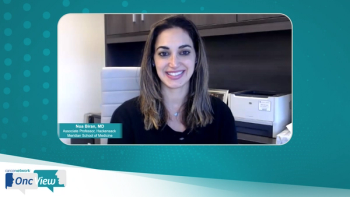
Emerging Therapies in Relapsed/Refractory Multiple Myeloma


Noa Biran, MD, reviews approved bispecific T-cell engagers and how they redefine multiple myeloma treatment, yielding high response rates in refractory cases, but their use necessitates careful evaluation in later therapy lines.

Noa Biran, MD, discusses how the phase III BOSTON trial evaluates selinexor + bortezomib and dexamethasone versus bortezomib and dexamethasone in relapsed/refractory myeloma.

Noa Biran, MD, discusses how selinexor targets nuclear export, inducing apoptosis in multiple myeloma cells. Its synergistic potential with approved agents makes it suitable across refractory cases, bridging therapy options and improving patients' quality of life.

Noa Biran, MD, delves into the phase II STOMP study, highlighting selinexor’s efficacy with various backbones like pomalidomide, carfilzomib, daratumumab, and reviews dosing strategies and proactive management of associated toxicities.

Noa Biran, MD, discusses the potential sequencing of selinexor with newer B-cell maturation antigen (BCMA)-directed therapies like CAR-T cells and bispecific antibodies, and explores optimizing treatment sequences to maximize efficacy, minimize resistance, and manage toxicity profiles.

Noa Biran, MD, addresses unmet needs in relapsed/refractory multiple myeloma, focusing on reducing treatment burden and exploring fixed-duration therapies post-transplant, and highlights potential consolidation approaches with CAR-T cells or novel agents.

Noa Biran, MD, speaks about recently approved bispecific therapies and current trials that may impact the standard of care in relapsed/refractory multiple myeloma.

